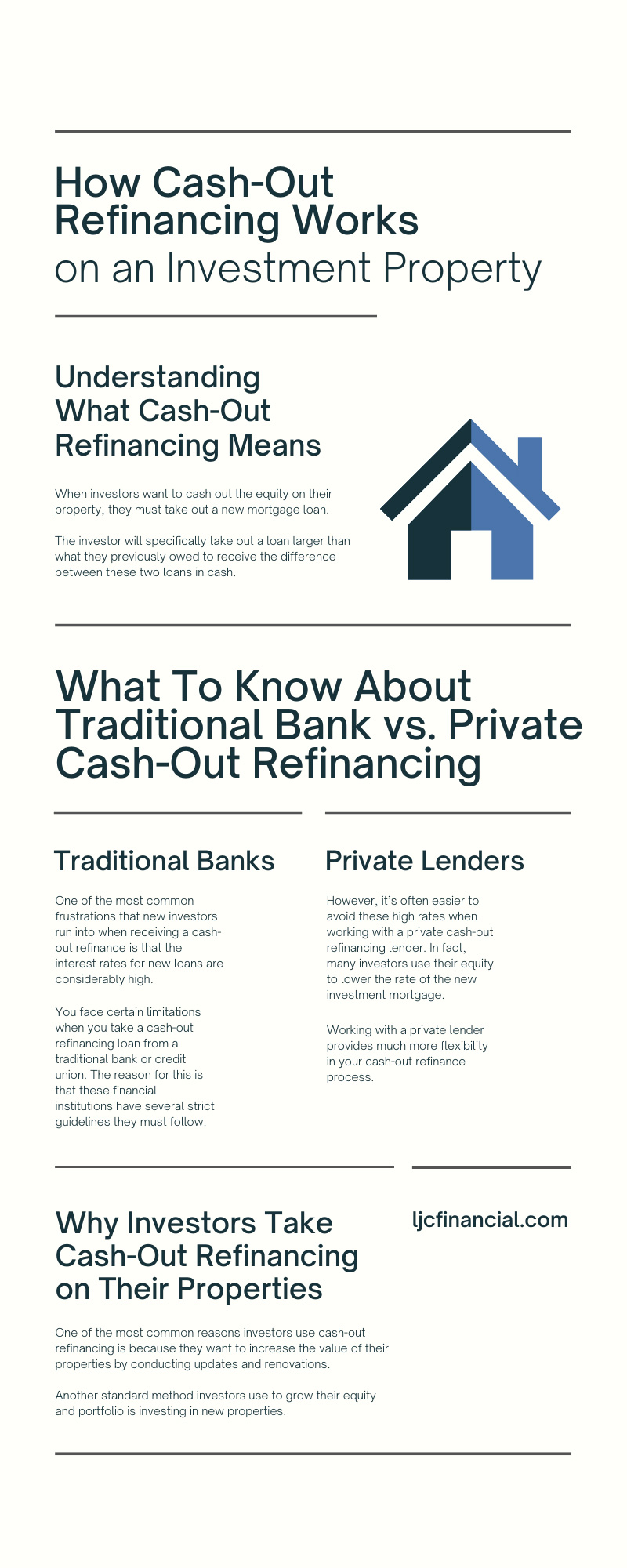
One of the best benefits of investing in a rental property is earning valuable equity. You may come to a point where the equity of your investment has grown exponentially, and the housing market is at a prime selling point. This is the perfect time to cash out your earned equity and use your capital for other investments.
However, cashing out your investment’s equity can be a cumbersome process to navigate. When handling large sums of money, you never want to risk losing portions of your equity due to misinformation. Working with traditional banks or credit unions can limit your cash-out refinance options. If you’ve accumulated considerable equity and want to cash out your earnings, we’ll guide you through the process. Here’s our guide on how cash-out refinancing works on an investment property.
Understanding What Cash-Out Refinancing Means
Before we explain how cash-out refinancing works on investment properties, we’ll examine what cash-out refinancing means. When investors want to cash out the equity on their property, they must take out a new mortgage loan.
The investor will specifically take out a loan larger than what they previously owed to receive the difference between these two loans in cash.
Cash-Out Refinancing Example
Let’s say an investor has a current mortgage loan of 50,000 dollars. If this investor applies for cash-out refinancing on this property, they’ll take out a loan of 150,000 dollars. As a result, the investor can use this new loan to pay off their old loan and receive 100,000 dollars in cash as the difference between those two loans.
Now that you understand what cash-out refinancing means, we’ll examine what you should know about cash-out refinancing.
What To Know About Traditional Bank vs. Private Cash-Out Refinancing
Cash-out refinancing can become an excellent way to expand your investments. However, investors should be aware of the interest rates and strict guidelines connected with using banks and credit unions for their refinancing.
Traditional Banks Have Higher Interest Rates
One of the most common frustrations that new investors run into when receiving a cash-out refinance is that the interest rates for new loans are considerably high. The reason why investors become stuck with high interest rates is that investment properties inherently have significant risks.
Private Lenders Have Flexible Interest Rates
However, it’s often easier to avoid these high rates when working with a private cash-out refinancing lender. In fact, many investors use their equity to lower the rate of the new investment mortgage.
Traditional Banks Have Stricter Guidelines
You face certain limitations when you take a cash-out refinancing loan from a traditional bank or credit union. The reason for this is that these financial institutions have several strict guidelines they must follow. For example, your credit score must be high enough for approval, and you must have more than 25 percent equity in the property to cash out your earnings.
Private Lenders Have Fewer Restrictions
Working with a private lender provides much more flexibility in your cash-out refinance process. Not only do private lenders give you access to your equity faster, but you also benefit from asset-based financing.
This means that if your credit score as an investor is low while your future investment is profitable, you can still receive cash-out refinancing. Of course, some restrictions may still apply to you due to the risk of rental property investments. But these limits will be considerably more manageable compared to those associated with traditional bank loans.
When To Take Out Cash-Out Refinancing on Investment Properties
The best time to take out cash-out refinancing on your investment properties is when your investments have accumulated a large equity figure. Apart from the exact value of your property, investors should also pay attention to fluctuations in the housing market.
The demand and value for homes can drastically change in a short amount of time. If you notice that the value of properties in your area is steadily increasing, you should consider going with the cash-out route to refinance your investment.
Why Investors Take Cash-Out Refinancing on Their Properties
Now that you know how cash-out refinancing works and what new investors should expect from this process, you need to learn about the benefits of tapping into your equity. When you receive cashback from your investments, you can use this money toward anything.
There are no obligations or restrictions in terms of what or where you can reinvest your cash. However, if you want to continue growing your equity and maximizing your profits, the best option is to reinvest your money. Here are two major reinvestments we recommend to expand your earnings.
Renovating a Property
One of the most common reasons investors use cash-out refinancing is because they want to increase the value of their properties by conducting updates and renovations. For older properties, finding funding for essential maintenance projects is crucial. These renovations will ultimately improve a rental property’s value so that investors can charge more for rent and earn larger profits over time.
Investing in New Properties
Another standard method investors use to grow their equity and portfolio is investing in new properties. When you use your cash-out refinancing as a down payment to close on a new property, you create an opportunity to increase your future profits and continue growing your investment portfolio.
Regardless of whether you decide to use your cash-out refinance money to start renovations or invest in new homes, it’s essential that you use this opportunity to increase your future profits.
The Takeaway
We hope our guide to cash-out refinancing has been beneficial. Although tapping into your property’s equity is intimidating, you shouldn’t miss out on this opportunity to maximize your profits. Instead, keep an eye on your investment’s equity and apply for cash-out refinancing from private lenders.
Cash-out refinancing will allow you to receive cash back from your investments so that you can reinvest it in new projects and grow your portfolio. The more acquainted you become with this process, the larger your profits will likely be in the future.
Once you’re ready to start refinancing your current rental property, contact LJC Financial to begin. As private lenders, we offer fast, convenient, and flexible financing to help you grow your portfolio and earn more back from your investments. To learn more about our team, loans, and services, explore the LJC Financial website for more information.

